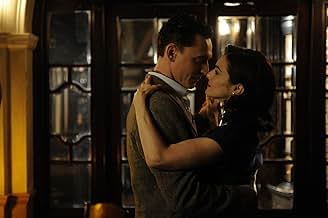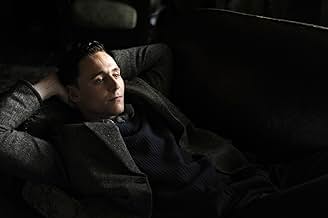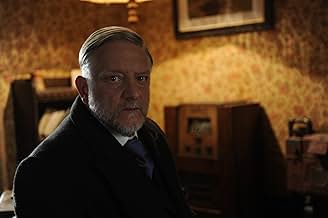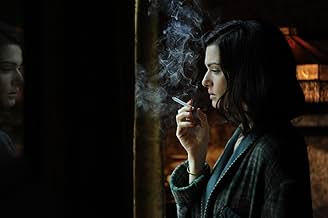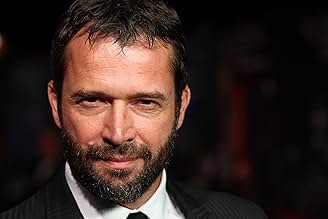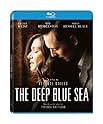IMDb-BEWERTUNG
6,2/10
17.191
IHRE BEWERTUNG
Die Frau eines britischen Richters findet sich in einer selbstzerstörerischen Liebesbeziehung mit einem Piloten der Royal Air Force wieder.Die Frau eines britischen Richters findet sich in einer selbstzerstörerischen Liebesbeziehung mit einem Piloten der Royal Air Force wieder.Die Frau eines britischen Richters findet sich in einer selbstzerstörerischen Liebesbeziehung mit einem Piloten der Royal Air Force wieder.
- Regie
- Drehbuch
- Hauptbesetzung
- Auszeichnungen
- 5 Gewinne & 13 Nominierungen insgesamt
Jorge Ojeda-Dávila
- Man in Bunker Bed
- (Nicht genannt)
Owen Thomas
- Caretaker
- (Nicht genannt)
Empfohlene Bewertungen
After watching the Terence Rattigan DVD collection (with most of the adaptations being from the 70s and 80s) when staying with family friends last year, Rattigan very quickly became one of my favourite playwrights and he still is. His dialogue is so intelligent, witty and meaty, his characterisation so dynamic, complex and real and the storytelling so beautifully constructed.
'The Deep Blue Sea' may not be among my favourite Rattigan plays ('The Browning Version', 'The Winslow Boy', 'Separate Tables'), but it's still wonderful and distinctively Rattigan. The writing is 24-carat Rattigan and the story is timeless in its searing emotion and romantic passion. It's very sharply observant and witty at times too. Of the four versions seen of 'The Deep Blue Sea' (this, Penelope Wilton, Vivien Leigh and Helen McCrory), this one is my least favourite, the McCrory stage version coming out on top.
It certainly has its merits. Its best asset is the acting, with the creme De la creme being a stunning Rachel Weisz, a heart-breaking, passionate and sympathetic performance but with a dignity and strength that prevents Hester from being too passive. Tom Hiddleston brings charm to a very caddish role, while Simon Russell Beale successfully stops Collyer from being too one-sided and Barbara Jefford is suitably icy. Karl Johnson is a kindly Mr Miller and Ann Mitchell is solid as rocks. Weisz and Hiddleston have an intense and poignant chemistry together.
Visually, 'The Deep Blue Sea' looks beautiful. Especially the sublime and hauntingly atmospheric cinematography, which perfectly complements the sumptuous, evocative period detail. Terence Davies captures the passionate intensity and searing emotion of the story very well, there are some very affecting moments here and the tea scene at the mother's house is very well written and acted and the ending is powerful.
Rattigan's writing shines on the most part, heavy on talk (true of the play and Rattigan in general) but intelligent, sharply observant, thought-provoking and full of pathos and insight.
However, some aspects of 'The Deep Blue Sea' frustrate annoyingly. Too often, the film mood-wise takes itself too heavily and too seriously. The play has a serious subject, but Rattigan also in the play gave it his usual wit and verve that helped it not get too heavy. This wit and verve is completely lost here and as a consequence the film feels too dark in terms of mood and overly gloomy and the leaden pace in some scenes, which felt like it was stretched to pad things out, disadvantages it further.
Didn't know what to make of the music. With the pre-existing music, it is lovely music on its own but didn't fit with the film, being used in a way that felt overused and excessive that made the story more melodramatic than it actually is. Barber's beautiful Violin Concerto, played just as well by Hilary Hahn in one of the more famous interpretations of the work, is particularly true to this, on its own lovely, excessively melodramatic in how it was used in the film.
First 10-15 minutes were puzzling, with images that came over as very fragmented and self-indulgent and the flashbacks don't add as much as they ought and convolute the storytelling. Those unfamiliar with the play should not be put off and think the play is like how the story is presented here, with the messing around of chronology the story felt jumbled, disjointed and incomplete here whereas the structure and character motivations (which were not explored enough here meaning that the complex characters are not as complex) are much clearer in the play.
Overall, a lot of beautiful things but it was very frustrating when reminded constantly at how so much better the film could have been if told with more clarity and taken less seriously. 6/10 Bethany Cox
'The Deep Blue Sea' may not be among my favourite Rattigan plays ('The Browning Version', 'The Winslow Boy', 'Separate Tables'), but it's still wonderful and distinctively Rattigan. The writing is 24-carat Rattigan and the story is timeless in its searing emotion and romantic passion. It's very sharply observant and witty at times too. Of the four versions seen of 'The Deep Blue Sea' (this, Penelope Wilton, Vivien Leigh and Helen McCrory), this one is my least favourite, the McCrory stage version coming out on top.
It certainly has its merits. Its best asset is the acting, with the creme De la creme being a stunning Rachel Weisz, a heart-breaking, passionate and sympathetic performance but with a dignity and strength that prevents Hester from being too passive. Tom Hiddleston brings charm to a very caddish role, while Simon Russell Beale successfully stops Collyer from being too one-sided and Barbara Jefford is suitably icy. Karl Johnson is a kindly Mr Miller and Ann Mitchell is solid as rocks. Weisz and Hiddleston have an intense and poignant chemistry together.
Visually, 'The Deep Blue Sea' looks beautiful. Especially the sublime and hauntingly atmospheric cinematography, which perfectly complements the sumptuous, evocative period detail. Terence Davies captures the passionate intensity and searing emotion of the story very well, there are some very affecting moments here and the tea scene at the mother's house is very well written and acted and the ending is powerful.
Rattigan's writing shines on the most part, heavy on talk (true of the play and Rattigan in general) but intelligent, sharply observant, thought-provoking and full of pathos and insight.
However, some aspects of 'The Deep Blue Sea' frustrate annoyingly. Too often, the film mood-wise takes itself too heavily and too seriously. The play has a serious subject, but Rattigan also in the play gave it his usual wit and verve that helped it not get too heavy. This wit and verve is completely lost here and as a consequence the film feels too dark in terms of mood and overly gloomy and the leaden pace in some scenes, which felt like it was stretched to pad things out, disadvantages it further.
Didn't know what to make of the music. With the pre-existing music, it is lovely music on its own but didn't fit with the film, being used in a way that felt overused and excessive that made the story more melodramatic than it actually is. Barber's beautiful Violin Concerto, played just as well by Hilary Hahn in one of the more famous interpretations of the work, is particularly true to this, on its own lovely, excessively melodramatic in how it was used in the film.
First 10-15 minutes were puzzling, with images that came over as very fragmented and self-indulgent and the flashbacks don't add as much as they ought and convolute the storytelling. Those unfamiliar with the play should not be put off and think the play is like how the story is presented here, with the messing around of chronology the story felt jumbled, disjointed and incomplete here whereas the structure and character motivations (which were not explored enough here meaning that the complex characters are not as complex) are much clearer in the play.
Overall, a lot of beautiful things but it was very frustrating when reminded constantly at how so much better the film could have been if told with more clarity and taken less seriously. 6/10 Bethany Cox
Overindulgent and somewhat stuffy romantic drama that is saved single handedly by the Oscar caliber performance of Rachel Weisz, who gives a very complex and realistic look at a women whose self destructing over her choices in life in post war Britain in the 1950's. Weisz so good that she brings a lot of life into a somewhat lifeless screenplay that is more into atmosphere than substance. Both of her leading men are fine and lent great support to the vibrant Weisz, who is keeping this film afloat almost by herself while the movie gets a bit claustrophobic towards its climax. The film does have some great moments ( The pub scene and the intimate moment between Weisz and leading man Tom Hiddleston while dancing) but that's more the credit to Weisz and the cast than the film itself. Rachel Weisz has always been one of the most gifted and versatile actresses working today, not being afraid to do different characters and being unlikeable and raw in the process. In this film, she gives in my opinion the best female acting performance in the last few years, giving a complex and rich performance with a character that could have easily been botch by even a great actress, especially with a screenplay that is more into itself than the audience watching the movie. Weisz proves in this movie that she's more than a great actress, she proves that she is one of the best actresses we ever had.
Her phenomenal performance alone is the real reason to see this movie.
Her phenomenal performance alone is the real reason to see this movie.
Yes, the film is depressing. Yes, it is very long (or it feels rather longer than it is). But, it is good. After viewing it, I couldn't get it out of my mind. It's utterly haunting. There are many things that were less than great in this film. But I've narrowed it down to 1: The Pacing. If this one flaw were corrected, it would have made an excellent film. But, rather than focusing on the negative, I will write about the positive aspects of this particular movie. First, the cinematography is excellent. Those ultra-saturated colors serve the film and the period which it represents very well. I've covered the editing (in the negative) but I will say that there were some surprisingly beautiful camera movements in the piece, that were noticeable, yet served the mood of the story very well. However, if you ever see this film, I would recommend it for the wonderfully subtle performance of Rachel Weisz, who has grown into one of the best actors of her generation. Everything you need to know about the way her character is feeling is not always in the dialogue, but on her mesmerizing face. Weisz makes you not necessarily relate (it is, almost always un-relatable, because of the period and the character that she is playing), but she does make you care. There is no question that this is not a film for everyone. It is slow, it is internal, but it is also worth giving it a try. I moaned and complained all the way through, but in the end, I was unable to stop thinking about it. And, that alone is a testament to its power. It slowly gets under your skin, and you won't even notice it!
i saw this with twenty something people. This was not a movie for them, but it is a most superior film for older people who have seen people live torturous lives. Why people do things that hurt themselves is a intriguing question which fascinates psychologists and artists alike. No one has come up with a satisfactory answer, not even a plausible one, and Freud leads the list of the clueless. Thus, Hester (played by a wonderful Rachel Weisz) can fascinate those of us who care about the inner working and emotional vicissitudes of a self destructive woman and who will learn about the human condition by considering her behavior. Simon Beale and Tom Hiddleston, the men in her life, are equally impressive performers playing equally limited (Beale) and troubled (Hiddleston) persons.
First, I think most people don't know where the title comes from. A song popular during the second world war (a recent event in this film), has the line "we're caught between perdition and the deep blue sea." This is an apt description of the three protagonists.
This film might be quite tedious for those in a hurry to move on with their lives. The three main characters are stuck and seem to have no capacity for getting unstuck. This is tough to contemplate if you can't wait for your tomorrow's great triumph, or if you see romance as a smooth road to your personal paradise.
The rest of us are mesmerized as these troubled lives unfold on screen. Yes, the mood and physical atmosphere are almost relentlessly dark (it needn't have been); The film is completely without humor, and it is much too slow moving. These are minor difficulties. The script and performances are magnificent.
First, I think most people don't know where the title comes from. A song popular during the second world war (a recent event in this film), has the line "we're caught between perdition and the deep blue sea." This is an apt description of the three protagonists.
This film might be quite tedious for those in a hurry to move on with their lives. The three main characters are stuck and seem to have no capacity for getting unstuck. This is tough to contemplate if you can't wait for your tomorrow's great triumph, or if you see romance as a smooth road to your personal paradise.
The rest of us are mesmerized as these troubled lives unfold on screen. Yes, the mood and physical atmosphere are almost relentlessly dark (it needn't have been); The film is completely without humor, and it is much too slow moving. These are minor difficulties. The script and performances are magnificent.
THE DEEP BLUE SEA is set in the 1950′s and flashes back to the War years of the 40′s – so it is appropriate that the title also features in a popular song lyric of the time ' we are all between perdition and the deep blue sea'.
London in 1950 was still very much showing the effects of the War and amid this drab and shattered cityscape, in a small dingy flat, Hester ( Rachel Weisz) has decided to commit suicide using the gas meter, but is revived. Hester had been married to the wealthy but tightly wound Judge, Sir William Collyer, but left him to live with a dashing ex RAF pilot, Freddie Page. The story takes place over a single day about ten months after Hester leaves her husband.
This was originally a Terence Rattigan play that first went to screen in the 1950′s with Vivian Leigh in the lead role and Kenneth More as Freddie and Eric Portman as the stern judge. Rachel Weisz is nothing short of incandescent in the part. She is a polished, accomplished actress who keeps getting better as she goes on. Hester has taken what many would say, a wild and foolish step in leaving her safe and affluent husband for the feckless Freddie and a relationship that while initially passionate, intense and thrilling, is ultimately doomed, as less than a year after the move, Freddie is more centred on drinking in pubs and playing golf while Hester sits forlorn and neglected in a shabby, dingy flat. It is her birthday, Freddie has forgotten. She is alone.
The editing, direction and cinematography are extremely good. Two scenes remain with me for poignancy. In a flashback to the Blitz, Hester and Sir William take shelter in a tube station, huddled with other cold and weary Londoners. Above, the bombs rain down thunderously upon their city, while on the platform, a lone soldier sings 'Molly Malone'. The other has Hester and Freddie dancing in a pub, smoke sits heavy on the air, the light is fractured through the window slats and the Jo Stafford song that was so popular at the time ' You Belong To Me' has the patrons singing with it.
The film was both written and directed by Terence Davies. Perhaps because both Terences ( Rattigan and Davies) were / are gay men, there is a nuanced sympathy for Hester whose life from its start as a Vicar's daughter, through to her marriage to a hidebound upper class man whose mother loathed her as unfit for him, and culminating in her last chance at happiness and love being smashed because Freddie is a shallow and fickle man whose greatest time was as a RAF pilot during the Blitz and he will never move on from that.
A mature, well crafted film, with occasional echoes of BRIEF ENCOUNTER, it has many strong points, but none stronger than Rachel Weisz. 3 and a half stars.. filmnotion.com
London in 1950 was still very much showing the effects of the War and amid this drab and shattered cityscape, in a small dingy flat, Hester ( Rachel Weisz) has decided to commit suicide using the gas meter, but is revived. Hester had been married to the wealthy but tightly wound Judge, Sir William Collyer, but left him to live with a dashing ex RAF pilot, Freddie Page. The story takes place over a single day about ten months after Hester leaves her husband.
This was originally a Terence Rattigan play that first went to screen in the 1950′s with Vivian Leigh in the lead role and Kenneth More as Freddie and Eric Portman as the stern judge. Rachel Weisz is nothing short of incandescent in the part. She is a polished, accomplished actress who keeps getting better as she goes on. Hester has taken what many would say, a wild and foolish step in leaving her safe and affluent husband for the feckless Freddie and a relationship that while initially passionate, intense and thrilling, is ultimately doomed, as less than a year after the move, Freddie is more centred on drinking in pubs and playing golf while Hester sits forlorn and neglected in a shabby, dingy flat. It is her birthday, Freddie has forgotten. She is alone.
The editing, direction and cinematography are extremely good. Two scenes remain with me for poignancy. In a flashback to the Blitz, Hester and Sir William take shelter in a tube station, huddled with other cold and weary Londoners. Above, the bombs rain down thunderously upon their city, while on the platform, a lone soldier sings 'Molly Malone'. The other has Hester and Freddie dancing in a pub, smoke sits heavy on the air, the light is fractured through the window slats and the Jo Stafford song that was so popular at the time ' You Belong To Me' has the patrons singing with it.
The film was both written and directed by Terence Davies. Perhaps because both Terences ( Rattigan and Davies) were / are gay men, there is a nuanced sympathy for Hester whose life from its start as a Vicar's daughter, through to her marriage to a hidebound upper class man whose mother loathed her as unfit for him, and culminating in her last chance at happiness and love being smashed because Freddie is a shallow and fickle man whose greatest time was as a RAF pilot during the Blitz and he will never move on from that.
A mature, well crafted film, with occasional echoes of BRIEF ENCOUNTER, it has many strong points, but none stronger than Rachel Weisz. 3 and a half stars.. filmnotion.com
Wusstest du schon
- WissenswertesTerence Davies wanted Rachel Weisz for the part of Hester Collyer after he noticed her "incredible talent" in Amy Foster - Im Meer der Gefühle (1997), even though he hadn't heard of her before seeing that film. He called his agent and asked, "Have you ever heard of this girl Rachel Weisz?" His agent laughed and said, "She's an Oscar winner!" Weisz was amused by this and said, "I don't think Terence [Davies] knows very well anyone who's not in a black and white film."
- Zitate
Freddie Page: Let me give you a case: Jack loves Jill, Jill loves Jack. But Jack doesn't love Jill in the same way. Jack never asked to be loved.
Hester Collyer: And what about Jill?
Freddie Page: That's Jill's hard luck! I can't be bloody Romeo all the time!
- VerbindungenFeatured in Maltin on Movies: The Watch (2012)
- SoundtracksConcerto for Violin and Ochestra, Op. 14
Composed by Samuel Barber
Published by G. Schirmer, Inc (ASCAP)
Performed by Hilary Hahn & The Saint Paul Chamber Orchestra
Conducted by Hugh Wolff
Licensed courtesy of Sony Music Entertainment Inc.
Top-Auswahl
Melde dich zum Bewerten an und greife auf die Watchlist für personalisierte Empfehlungen zu.
- How long is The Deep Blue Sea?Powered by Alexa
Details
- Erscheinungsdatum
- Herkunftsländer
- Offizieller Standort
- Sprache
- Auch bekannt als
- Dục Vọng Đàn Bà
- Drehorte
- Produktionsfirmen
- Weitere beteiligte Unternehmen bei IMDbPro anzeigen
Box Office
- Bruttoertrag in den USA und Kanada
- 1.126.525 $
- Eröffnungswochenende in den USA und in Kanada
- 123.841 $
- 25. März 2012
- Weltweiter Bruttoertrag
- 3.143.514 $
- Laufzeit
- 1 Std. 38 Min.(98 min)
- Farbe
- Sound-Mix
- Seitenverhältnis
- 1.85 : 1
Zu dieser Seite beitragen
Bearbeitung vorschlagen oder fehlenden Inhalt hinzufügen



